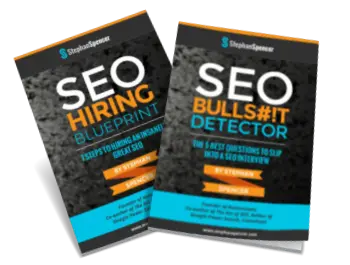Karl Fitzpatrick interviews Stephan Spencer, the author of ‘The Art of SEO’
Welcome back to Southeast Radio’s Business Matters with me, Karl Fitzpatrick. My final guest, Stephan Spencer, is an SEO supremo and the author of the book The Art of SEO. Stephan, perhaps you can start the interview by highlighting your search engine optimization credentials.
Sure. I started doing SEO back in the 90s, in the very early days. Back before even Google existed, back in those early days of SEO, I was all about trying to figure out how the algorithms worked, poking and prodding at the black box and figuring out, kind of reverse engineering what worked and what didn’t.
Over the course of working with a number of clients for whom we were building websites, companies like Birdseye and so forth, we were able to really upskill and figure things out. Then, we started offering SEO audits and consulting beyond just building SEO into the websites for our web development clients. And yeah, I’ve been doing this for a very long time. The first edition of the Art of SEO came out in 2009. By then, I had been doing SEO for well over a decade.
And from your experience, what are the major SEO challenges that businesses face in 2019?
Well, what the oftentimes struggle with at the very beginning is figuring out what to do to start off or another. A common problem is that they will hire somebody who doesn’t have the chops and isn’t very good at SEO, maybe to build links. These links end up being low-quality, and they get you in trouble with Google. And it’s very hard to dig yourself out of a hole like that because you’ve been penalized by Google algorithmically or a manual action, a manual penalty.
And how can businesses identify the difference between good quality and bad quality links?
Well, good quality are ones that appear to be earned naturally, that aren’t engineered, and not some backdoor deal has been done to get them. They look editorial. A commercial link is one that tends to be site-wide in the footer or sidebar. It’s not in the main copy of the page. It’s got overengineered anchor text, meaning that it’s got keywords in the underlying words that are not common, like used cars, Ireland or something like that.
That’s not a common anchor text. Those are not common words that you would underline. So, things that make it look unnatural. We’ll stick out to an algorithm, but you can also use tools to evaluate whether the links are from low-quality neighborhoods on the web or high quality, like high authority, high trust websites or low quality. Some tools that we’ll do very well include LinkDetox from LinkResearchTools.com, Majestic, and Ahrefs. These are all excellent tools that will ascertain whether the link neighborhood that you’re in is good or bad.
And what percentage of businesses do you think are maximizing the benefits that can be delivered through SEO?
I’d say most companies are underutilizing the value that SEO provides. Even big companies, but certainly smaller businesses, just don’t know what they’re missing out on. And so they’re relying too heavily on paid ads, like Google ads and so forth. The problem with Google ads is that the moment you stop spending money, you stop receiving the benefits that those Google ads have been bringing you.
Whereas with SEO, it’s an asset. It builds a value asset value over time to get these high-quality links pointing to your site and to optimize. You’re SEO on the page. So, the website itself is finely tuned to rank well on Google.
So, specific to SEO, what do you think are the key areas that businesses are underutilizing?
So, I think the hardest nut to crack for a small business person is the link-building side of it. Like, how do they get high-quality links from authoritative, trusted websites? Because they don’t have control over those websites, whether they link to them or not, or how they link to them, it’s a big mystery. It’s almost like a secret. But I do have a chapter in the art of SEO, chapter seven, dedicated to that aspect of content marketing and link building.
So share some of the ideas from the book with us this morning, please.
Yeah. So I would recommend starting with identifying websites relevant to your business and/or niche that have good authority and trust scores according to tools like Ahrefs, Majestic and Link Research Tools, then offering them a give.
You know, it’s a give, then a get. If you could imagine adding value to their community through some sort of collaboration or offering some value to them, that’s a great way to start the conversation and, hopefully, an ongoing relationship. One of the best ways to build relationships is in the real world.
So, go to events and conferences for your industry. Meetups are networking functions where influential website owners and bloggers hang out. For example, there are blogger conferences. There’s a women’s blogger’s conference, for example, called Blogher, and you could go there if you’re targeting women as a primary demographic. That would be a great conference for you to meet other influential bloggers and work out relationships with them.
Are many of these bloggers now charging for links?
Yes, that’s a great question. They do oftentimes charge, and I would not ever pay them money in terms of the opportunity to get a link because that leaves a certain kind of footprint for Google to pick up with their algorithms.
If they’re willing to take money from you, then they’re willing to take money from other sites, other business owners who are probably not as relevant, and who probably don’t have as high-quality products as you do. And that sticks out like a sore thumb to an algorithm.
Now, traditionally, keywords were synonymous with SEO, but how relevant are they today?
They’re still relevant, but I would think in terms of what keywords are pretty relevant. Being typed into Google or spoken to Google because voice searches are getting bigger all the time. And those are individual words or phrases being typed in. They’re not what Google refers to as entities.
Once you have the keywords identified that the user is searching for in Google, then you can see if you’re ranking for those keywords. But you would need to use some ranking tools that hit multiple Google data centers from different locations just to see if you are truly at position one across multiple locations or just locally in your area.
Then, when you start thinking about some of the related keywords or terms, again, when you think of entities, that’s a collection of keywords. Then, you need to start writing copy that encompasses multiple of these keywords. I’m not talking about different verb tenses of the same keyword, singular or plural.
Google is much more sophisticated than that. So if you’re gonna write about lawnmowers. You only talk about lawnmowers, and you don’t talk about grass, lawn clippings, landscaping, weed whackers, or any of these other related keywords. It looks like a very surface-level piece of content, and you’re going to lose.
Now, you mentioned the emergence of voice search, and as you say, it’s a growing trend globally. So, when businesses are completing SEO tasks to ensure that their websites and apps are achieving better search results, is the same approach taken for text search as it is for voice?
Kind of. What I would recommend is that if you care about voice search, you should target what are called featured snippets. That’s the answer that preempts all the regular organic results. It’s either a paragraph or a bulleted list. And that, SEO, practitioners refer to as position zero, even above position one in the organic results.
If you can take the featured snippet spot, then you will be the answer in the voice search. So you win both for text search when people are typing in keywords and looking at the results on their mobile phone or their desktop. You win in voice search because you will be read aloud as the answer, the one answer because it’s not a Google voice search, which is not useful if it’s reading off a bunch of multiple answers. It needs to be; you need to be the answer, and that’s the featured snippet.
And how can a business secure that position?
Yeah. So it really helps if you are already ranking on page one; the higher, the better; it also matters if you get a higher-than-normal click-through rate for your position in the search results. So if you’re, let’s say, number seven in your competitor’s number two, you might still get the featured snippet, even though your competitor is outranking you organically because you have higher than normal click-through rates for your position at number seven.
You might have a more concise or comprehensive answer in your copy on your page that is better suited as the featured snippet than your competitors. Also, if you are in the more ideal format, for example, a how-to query, like how to boil an egg, would probably be best answered as a featured snippet with an ordered list, a numbered list, steps 1, 2, 3, 4, whereas if you’re listing the process of boiling an egg, just as one big paragraph copy. That’s not as ideal in the format, and a competitor might be used instead as the featured snippet because they did use a numbered list or they used headlines with numbering in their article.
And are we going to see a situation shortly whereby Google is going to deliver voice-related results for all voice-related searches?
I predict that we’re going to be heading to a world where the LUI, the Linguistic User Interface, is going to be the predominant mode for us to communicate with our technology. And it will be as big of a game changer, as big of a paradigm shift as it was when we went from the DOS prompt. Do you remember those days? When we switched to the GUI, the Mac took off, and then Windows—you know, the early days of Windows—that was a game changer.
That was a paradigm shift. And we’re going to see that same kind of paradigm shift, probably even bigger, when the LUI is really the way that we interface with our technology or with our computers and so forth because we can speak so much faster than we can type, especially on small devices. So, we’re going to get answers via voice; that way, we’re going to have augmented reality, glasses, or even contact lenses.
It’ll be a whole new world. Now, over the last number of years, we’ve seen lots of businesses invest in mobile-friendly websites. But in order to be able to prepare for the future, what type of a website would you recommend, and what language would you recommend it be written in?
Well, a website is something that you do, not something that you view. So you need to get out of the space. Paradigm or kind of trap that it’s a set of pages, a website. It really is an experience and that experience can be delivered via mobile could be delivered via, you know, like a mobile website or a mobile app.
It should probably be a responsive website, or you could take it to the next level and not just be responsive, where it works well and is optimized for both mobile and desktop, but also even have an app-like experience, and that’s called a Progressive Web App (PWA). Or you could take it to another level and create a pure mobile app like you’d find in the app stores of Google Play and iTunes.So that’s even more of an investment. But then you also need to look at things like AR and VR devices, play with Oculus Rift and all that. So it’s a rabbit hole that you could end up going down. But just having a mobile-friendly website is table stakes. It’s the bare minimum just to even show up at all.
Now, many small and local businesses have opted to operate without a website, and instead, they felt that social media presence was enough for them to have a Facebook page and an Instagram page; what’s your advice to them?
Well, it’s a terrible idea to rely on other sites and other businesses for your visibility. A friend of mine, James Schramko, who is an author and internet expert, calls it Own the Race Course. That means that you need to be in control of your own destiny, have your own website, your own presence that can not be taken away from you. You can’t have the rug yanked from under you because you violated some obscure terms of service item, and they shut your account down, and now your presence is wiped off of that primary platform that you were relying on.
If it’s Facebook or Instagram or whatever, it’s great to have a social media presence on the platforms that matter to your target audiences, but you shouldn’t rely on it because that is a very dangerous place to be.
Now, earlier in the interview, you referenced virtual and augmented reality. And, of course, their growth has been much slower than many commentators have predicted. Are you still optimistic about their growth over the coming years and the impact that they will have on search engine optimization?
I’m very bullish about AR and VR, yes. And, it will be a sudden, kind of up-and-to-the-right adoption curve. It’s going to be massive, just like we’ve seen with, you know, cell phones and fax machines and other technologies. It gets to a critical mass, and then boom, mass adoption. So it may not come in the next 12 months, but if you’re not preparing for it now, if you aren’t playing with the devices and dreaming big, brainstorming around use cases that involve your products and services, you’re going to be left behind in the dust when it suddenly hits that asymptote and whoosh all the way to the top.
Well, if you’ve just tuned in, that was Stephan Spencer, the author of The Art of SEO. And I would like to thank Stefan for sharing his experience with us this morning.


